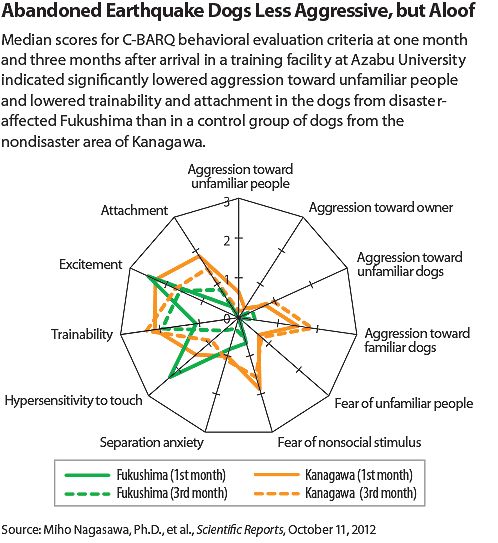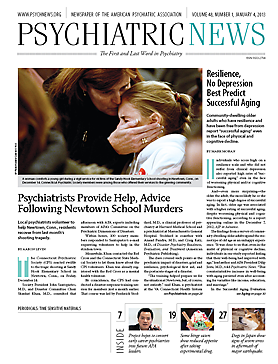Researchers in the Department of Animal Science and Biotechnology at Azabu University in Kanagawa, Japan, have reported that dogs abandoned in the aftermath of the March 11, 2011, earthquake that devastated the Tohoku coastline are exhibiting long-term signs of distress that mimic posttraumatic stress disorder (PTSD) in humans.
In the October 2012 Nature, lead author Miho Nagasawa, Ph.D., and his colleagues reported that the 340,000 people who are still living as refugees after the disaster are not the only ones seriously impacted by the tragedy—the earthquake also left many companion animals unintentionally abandoned.
“Many dogs have roamed or been chained and left alone for long periods, and some of them have been living in a semiferal state in the exclusion zone around the nuclear reactor,” they said.
Students at Azabu University have conducted a program to place abandoned dogs with new owners after provision of psychosomatic care in a training facility at the university, and Nagasawa and his colleagues, in an effort to elucidate the consequences of stress from one of the highest-magnitude earthquakes recorded in history, compared behavior and urinary cortisol levels between some of the disaster-affected dogs from Fukushima Prefecture and dogs that had experienced abandonment in a nondisaster area, Kanagawa Prefecture.
They used the Canine Behavioral Assessment and Research Questionnaire (C-BARQ) to assess the dogs and found that the Fukushima dogs showed significantly lower aggression toward unfamiliar people, lower trainability, and lower attachment when evaluated one month after being transported from the training facility. After three months, the Fukushima dogs showed significantly lower separation anxiety and attachment than the Kanagawa dogs. Urinary cortisol levels were monitored in both groups of dogs for 70 days after their arrival at the facility, and the Fukushima dogs exhibited cortisol levels five to 10 times higher than those of the Kanagawa dogs, a trend that persisted throughout the 10-week period.
The researchers said their work has limitations, including a small sample and a difference in age between the Kanagawa and Fukushima dogs (although an analysis of the age effect was performed, with no significant findings).
“The low trainability and attachment scores among these dogs warrant special attention,” said Nagasawa and his colleagues, who noted that impaired learning ability due to oversecretion of glucocorticoids is a core symptom in people who have experienced extreme stress, including those with PTSD. In addition, PTSD patients have been reported to show impaired ability with respect to attachment and bonding. “Similar results have been observed in experimental animals, and the disaster-affected dogs in this study appear to show signs of the same behavioral phenomenon. . . . Long-term care and concern regarding the psychological impact of disasters appears necessary in humans and companion animals,” they concluded. ■


